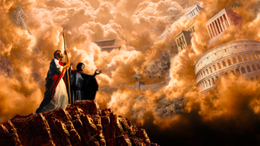 “Again, the devil took him to a very high mountain and showed him all the kingdoms of the world and their glory. And he said to him, ‘All these I will give you, if you will fall down and worship me.’ Then Jesus said to him, ‘Be gone, Satan! For it is written, “‘You shall worship the Lord your God and him only shall you serve’” (Matthew 4:8-10). Recently I was in a conversation regarding Jesus’ temptation in the desert. I have always found it rather remarkable that Satan offered to Jesus what already belonged to Him, namely “all the kingdoms of the world.” The temptation wasn’t to possess the kingdoms—Jesus already possessed them—but in how Jesus would respond to the offer. You and I would have responded, “These are already mine.” Jesus could have responded this way and it would have been all true. Jesus’ response could have been founded on privilege, His status with the Father. But yet, He did not respond in this way. Satan was attempting to get Jesus to act, to respond from His position as God’s Son. We can see this with the first temptation: “If you are really God’s Son, turn these stones into bread.” In the second, the same: “If you are the Son of God, jump—and God will catch you. Prove it.” In each case, however, Jesus did not respond from the privilege of His status as God’s Son. If He would have, that would have been the end of it—the end of it for all of us. No cross. No salvation. You see, Jesus did not give in to the temptation to assert His special status. No. Not at all. Jesus responded with the only thing that mattered (albeit in different ways, but still each time the same): “I will keep God’s word; I remain faithful to God’s covenant.” You and I—as I have heard so often—like to boast in our special status with God. For some reason (pride, most likely) we think we impress the non-Christian world with this stand. This is not the way. While this is true in that a Christian is a son of God, an adopted child of God, the temptation is to prop ourself up in front of others with this position rather than do what is necessary and the only thing that matters: will I keep God’s word and be faithful to His covenant? Sure, you say you are God’s child, you say you are a king (or queen as it may be). I get the royalty you claim. I know the proof-texts. But what we need to know is: will you keep God’s word and be faithful to His covenant? The temptation was not in possessing all the kingdoms of the world, but in humbling Himself—even to the point of death on the cross (e.g., Philippians 2:5-11). This is a real temptation for the Christian: To assert one’s privileged status with God before a watching world. I see this all the time on social media and in conversation among Christians (and in the presence of non-Christians). I even hear this in sermons, instructing Christians to assert their privileged status with God. While most certainly true, this is not the way of discipleship, not the way of following Jesus. All that matters is one thing: God wants to know, the watching world wants to know, even Satan wants to know, will you (will I) keep God’s word and be faithful to His covenant?
0 Comments
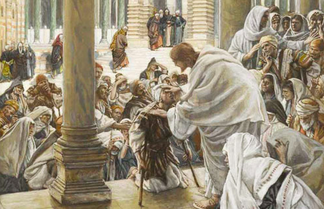 As of January 1, My wife and I live in the Hill, an apartment on Carlisle Street, right next to the Park where we do our summer BBQ ministry. I’m even close enough to walk downtown to meetings and events. One evening, walking back to the apartment from an aldermen’s meeting at town hall, I found myself waiting at a cross-walk when two guys (you can tell, kind of down and out, probably homeless) decided to go, even with traffic coming. One guy had a walker. He walked slow across the intersection, so I headed out with him, telling him, “They’ll have to hit me first.” He smiled and said, “Thanks.” We made it safely, catching up with his friend. They continued to walk slow. I moved on ahead, walking down the block back to my apartment, when I saw a Dunkin Donuts and remembered I had a gift card in my wallet my mom had given me for Christmas. I stopped in to see how much it was for . . . there were no markings . . . $10 the barrister said after scanning it. I went back up the block to my two slow walking friends and said, “Do you guys like coffee?” “Yes,” one of them replied. “I have a gift card for $10—it’s yours.” “Thanks.” They smiled. “Good, we can get a sandwich, too.” I told them: “I can’t take credit for it, my mom gave it to me for a Christmas present.” “Well then, tell your mom, thanks for us.” (I did.) I gave them the card and said, “You’ll see me around. You will see the hat and the ponytail” . . . and, before I could get my name out . . . “Yea, we know. You’re the pastor of the church on Davenport. We know who you are.” How about that? Priceless. Two street, homeless guys, a few blocks from the Hill knew who I was and where our church is. This reminds me that we need to be known . . . and if I get my New Testament correctly, known for the things that indicate the presence of the Kingdom of God. This morning I’d like to bring a messagefrom a thread of passages in the Gospel of Matthew. There is a narrative thread connecting Matthew chapters 4 through 11 that we should listen to, which focuses on Jesus associating with tax collectors and sinners, the poor, the unclean, and the presence of the Kingdom of Heaven. Matthew is asking the readers: How do others know that the Kingdom of Heaven has appeared? To give you the spoiler: Matthew tells us, they can see our association with the poor, marginalized, outcasts, and unclean. This is how they know. I. We are to Follow Jesus around and repeat (what he does):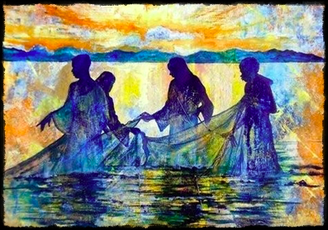 We like to take small bites on the Bible, so sometimes we miss big picture things. And, this is a Big Picture Thing we need to see so we may be better readers of Matthew's Gospel and more faithful followers of Jesus. We begin in Matthew 4:19 where Jesus makes the invitation, “Follow [lit. come after] me and I will make you fishers of men.” The command is to come-after Jesus. That’s the command--follow after me, really follow me around. Most think the command is to be fishers of men—it is not, that’s the promise. We are called to follow Jesus around and he promises to make us fishers of men. By getting the following correct, we become fishers of men. So, what does it mean to follow Jesus around—Matthew tells us. Straight away, just after the call to follow Jesus, Matthew reveals what it was like to follow Jesus around. There is a divine, inspired-ness to what the Gospel writers place into the narrative . . . so right after the scene where Jesus calls us to follow him around, we have . . .
Matthew tells us: we are made fishers of men by following Jesus around—and what did he do?
What we might not realize, however, is Jesus’ first encounter afterHe finishes the Sermon . . . Matthew could have introduced a dozen different encounters, but this is the one He chooses:
This is the Sermon on the Mount realized, illustrated, fulfilled. The Monday after the Sunday Sermon as it were. Now I’m going somewhere with this, so for now remember, following Jesus is actually following Jesus around, learning to do what he did . . . now, we are to repeat . . . *This sermon was preached at Redeemer Presbyterian Church in Concord, MA on Sunday, May 19, 2019. The full sermon maybe downloaded as a PDF (here). An audio version is also be available >> Audio version Part I | Part II | Part III | Part IV
If we turn the “poor in Spirit,” “those who mourn,” and “those who are meek” into “everyone who recognizes they are poor in spirit” and “we all mourn” and “we are all meek before God,” we rob the poor, the mourning, and the meek from the empowering words Jesus spoke. We rob the rich and powerful of the repentance and new vision of the kingdom that Jesus calls them to. We literally have taken the poor out of the “poor” and the mourning away from “those who mourn” and have turned everyone into being meek. We need to hear these beatitudes as if we are a part of that crowd (Matthew 4:23-5:3ff).
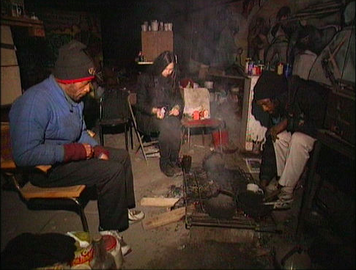 The Mole People of NYC underground The Mole People of NYC underground Some thoughts and ramblings from my sermon this past Sunday at Christ Presbyterian Church in the Hill (New Haven, CT). Our text on Sunday (9/30/18) was Matthew 4:12-22. I talked about church, church planting, and church ministry in uncool places–you know across the Jordon, out of bounds, the wrong side of the promised land, the wrong side of the railroad tracks, the Galilee of Gentiles, yeh them, those guys . . . so uncool and the wrong place to launch a movement that would change the world . . . I talked about the Hill and how outsiders view us . . . my good people let me be really real for a moment . . . and I talked about the Mole people, those cast aways, ignored, forgotten, smelly, hidden folks that live underneath New York City in the vast corridors of old train and subway tunnels . . . uncool . . . and why there isn't a line of Christians lining up for these places (the Hill and the Mole People tunnels) . . . upward mobility is a calling you know, not downward mobility (I am being sarcastic, if you can't tell) . . . where's that line of Christians called to uncool places? Then I talked about Jesus' call to follow him (Mat 4:19, "Follow me and I will make you fishers of men"). Most think this is a call to be fishers of men (whatever you think this means, it isn't); it is a call to follow Jesus and then he promises to make them "fishers of men." And, we saw right there in the story . . . they followed him (so you have the following, 4:20, 22) and then the fisher-training began (4:23 till the end of the Gospel). Matthew, in his crafting of 4:19, the command to follow actually "follow behind me," in other words, watch what I do when we are out in the public. So the fisher-training comes in this set of scenes right away:
I connected the fisher-following to the Great Commission at the end of Matthew. Gave it an intra-Matthean spin in light of the call to follow and the fisher-training: Go, therefore, and make disciples (other fisher-followers who will watch what you do, not just what you preach) of all nations (i.e., ethnic groups/πάντα τὰ ἔθνη), yes out there (to the Jewish first disciples) in very uncool places, among those polytheistic pagans, most definitely those across the railroad tracks. The Hill. The Mole People. Get lined up in those places, baptizing them in the name of the Father and of the Son and of the Holy Spirit, teaching them to observe all that I have commanded you (there's that fisher-training again). Make more fisher-followers because judgment will come (the actual thing behind the "fisher" metaphor), but be assured of this, if you go to those uncool places and make disciples, behold, I am with you always, even to the end of the age when the judgment will come upon the sons and daughters of Adam. Go heal. Be with the oppressed and afflicted. Those having seizures and cannot walk. Those in pain. This is the crowd I went to just after you followed (in chapter 4). This is being fishers of men. And this will be the same crowd, the afflicted and oppressed (note and compare Mat 4:25 and 5:1) that I will teach on that Mount (in chapter 5) is blessed. This will then show that the kingdom of heaven is at hand! For further understanding of the meaning of "fishers of men," check out this Wasted Blog >> Dangerous Sunday Devotions: Called to be fisher-followers of Jesus, emptying our advantage out for those at a disadvantage
“Blessed are the poor in spirit, for theirs is the kingdom of heaven” (Matthew 5:3). 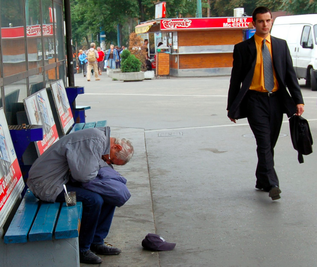 The way some Christians talk and make comments about this verse . . . you’d think that Jesus said, “Blessed are the ones who recognize their spiritual poverty and got themselves together, for theirs is the kingdom of heaven . . . “ NOT (at all)! When we teach that Jesus meant that “we are all spiritually poor” we rob both the rich (the opposite of poor) and the poor (the opposite of wealthy) of God's word to them––no one ends up “Blessed.” 1) For the one, the poor, this is a text of hope and of life, that God's got their back and that the world (this present world) isn't all it seems to be; 2) for the other, the rich, this text is an awakener (more a judgment), that they are on the wrong side of God's history. The rich are robbed of faithful discipleship when they think (and we teach them so), this text is about them. The rich-turned-follower of Jesus ought to read this text (and the remainder of the Sermon on the Mount) and ask, “How do I bring my life into alignment with the world Jesus envisions?” Not, “Phew, I get my spiritual poverty fixed, plus I get to stay rich AND inherit the kingdom of heaven.” Who wouldn't want a deal like that! Spoiler alert: the rich were the only ones to inherit anything anyway, so in some way they already had the “inheritance.” In fact, in the Greco-Roman world, the elite and wealthy were the only ones to get the world to come. Inheritance was the language of the rich, not the poor, which would have indicated how subversive Jesus' vision of the world would have been. The crowd Jesus preached his Sermon on the Mount to seems mostly made up of the crowd he was just previously ministering to in chapter 4: And he went throughout all Galilee, teaching in their synagogues and proclaiming the gospel of the kingdom and healing every disease and every affliction among the people. So his fame spread throughout all Syria, and they brought him all the sick, those afflicted with various diseases and pains, those oppressed by demons, those having seizures, and paralytics, and he healed them. And great crowds followed him from Galilee and the Decapolis, and from Jerusalem and Judea, and from beyond the Jordan . . . Seeing the crowds, he went up on the mountain, and when he sat down, his disciples came to him. And he opened his mouth and taught them, saying: “Blessed are the poor in spirit, for theirs is the kingdom of heaven . . . (Matthew 4:23-5:3). There is no doubt that both in the historical occasion (i.e., the scenes depicted in the text above) and for the "crowd” listening to Jesus' sermon, they understood to whom he was referring when he mentions "the poor.” Most likely "poor in spirit" reflects the Isaiah 61:1 that was promised and Jesus quoted to refer to Himself: "to bring good news to the poor; he has sent me to bind up the brokenhearted."
So, to hear and apply this beatitude (as well as the rest), we need to stop taking the poor out of the poor and making it everyone (because, you know, everyone is spiritually poor before God–just stop it!). This only cheapens what Jesus said–and no one gets blessed. |
AuthorChip M. Anderson, advocate for biblical social action; pastor of an urban church plant in the Hill neighborhood of New Haven, CT; husband, father, author, former Greek & NT professor; and, 19 years involved with social action. Archives
February 2024
Categories
All
|
Pages |
More Pages |
|

 RSS Feed
RSS Feed